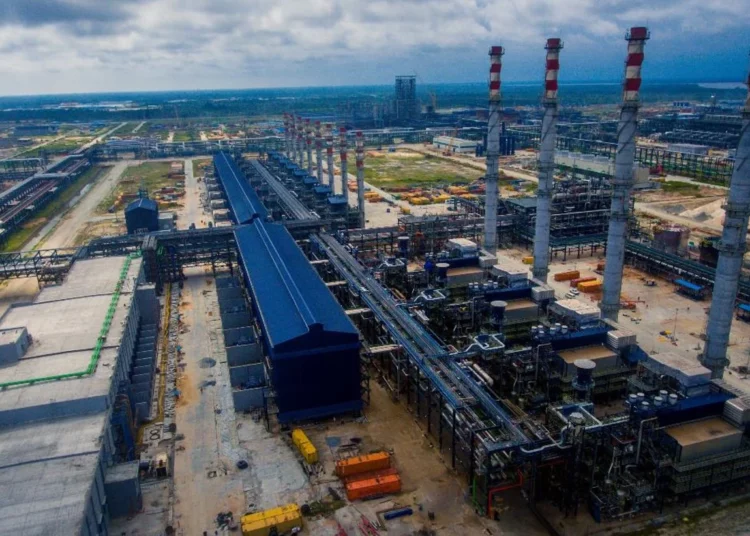An end is in sight to exploitation of African countries with huge appetite for refined petroleum products from European refiners as Dangote’s giant refining facility in Nigeria commences operations.
African countries have relied on importation of white products from Europe with a net value of $17 billion annually.
With commencement of refining operations, Dangote oil refinery is about bringing to an end a decades-long petroleum trade from Europe and mounting pressure on European refineries already at risk of closure from heightened competition, analysts and traders told Reuters.
The Dangote refinery built at a cost of $20 billion commenced production in January and has the capacity to refine up to 650,000 barrels per day (bpd) and will be the largest in Africa and Europe when it reaches full capacity.
The facility is a turning point for Nigeria’s quest for energy independence, which had relied on importation of almost all its fuel due to lack of in-country refining capacity.
Output from the Dangote refinery is expected to displace Nigeria’s fuel and chemical imports in 2024, according to the Economic Intelligence Unit (EIU).
The EIU forecasted a “tentative” increase in Nigeria’s crude oil production from an average of 1.12 million barrels per day (bpd) in 2022 to 1.4 million bpd by 2028.
The Economist Group’s research and analysis division, which provided this insight in its latest Nigeria country report, attributed this projection for 2028 to recent sector developments.
These developments include the near completion of the Dangote refinery, stability in the oil-producing Niger Delta, and the full commercialisation of the Nigerian National Petroleum Company Limited (NNPCL).
About a third of Europe’s 1.33 million bpd average gasoline exports in 2023 went to West Africa, a bigger chunk than any other region, with the majority of those exports ending up in Nigeria, Kpler data shows.
“The loss of the West African market will be problematic for a small set of refineries that do not have the kit to upgrade their gasoline to European and U.S. specification,” consultancy FGE’s head of refined products Eugene Lindell said, referring to more stringent environmental standards for other markets.
As much as 300-400,000 bpd of refining capacity in Europe is at risk of closure because of rising global gasoline production, according to Kpler’s analyst Andon Pavlov.
A European refinery executive who declined to be identified said coastal refineries that are geared for exports will be more exposed while inland refineries are less vulnerable because they rely on local demand.
“The changes won’t happen overnight, but they could ultimately lead to closures of refineries and their conversion to storage terminals,” he added, referring to the challenging market environment.
Pavlov said the UK’s Grangemouth and Germany’s Wesseling refineries could close ahead of schedule as a result of looming gasoline oversupply later this year and consequent pressure on refining margins.
Petroineos CEO Franck Dema flagged the energy transition which is causing demand for fossil fuels to dwindle as one of the reasons behind his company’s decision to shut down Grangemouth next year. Shell said its decision to shut down Wesseling next year was part of its drive to reduce carbon emissions.
Petroineos did not respond to a request for comment and Shell declined to comment about whether its plant could close ahead of schedule.
Around 30 European refineries have shut down since 2009, data from refining industry body Concawe show, with nearly 90 plants of various sizes and complexities still in operation.
Closures have been brought on by competition with newer and more complex plants in the Middle East and Asia and more recently because of the impact of the COVID-19 pandemic.
Since 2016, Europe has lost 1.52 million barrels per day of operational crude distillation which currently stands at 13.93 million bpd, consultancy IIR’s data shows.
Most of the decrease took place in 2021 and 2022 as demand destruction during the COVID-19 pandemic forced shutdowns.
European refineries don’t produce enough diesel to meet regional needs but produce too much gasoline and rely on exports to clear excess supply.
West Africa has long been the main outlet for gasoline that doesn’t meet stricter environmental restrictions in Europe on sulphur and metals content.
That trade accounted for $17 billion in 2023, according to price data from Argus Media and Reuters calculations.
The Dangote refinery, funded by Africa’s richest man Aliko Dangote, was configured to produce as much as 53 million litres of gasoline a day, about 300,000 bpd.
The drop in West African imports will coincide with new environmental laws in Northwest Europe that will force plants to reconfigure, seek new markets for lower-quality gasoline, or close down.
Plants that have funds to reconfigure could direct gasoline exports to the U.S. or South America, Kpler senior refining analyst Yaping Wang said.
But upgrading refineries is also difficult because banks are wary of lending money to fossil fuel projects.
“Even if you find a bank which will fund a European refinery upgrade project, rates will be too high to make it work,” said an executive at a major U.S. bank which lends to oil companies





